
At first glance, the 2012 documentary Brooklyn Castle is ostensibly a film about chess, and the child stars who come to master it. Intermediate School 318 is a junior high school in Williamsburg, Brooklyn, with an exemplary chess course, now known throughout the U.S for having secured, at the time of release, no less than 26 national chess titles. That’s an impressive feat for a school classified as a “Title 1 School”, meaning, in the words of former principal Fortunato Rubino, that they “have a poverty level of above sixty percent. Ours is closer to seventy, seventy-five.” Against the odds of their surroundings, chess is a way for these kids to not only understand accomplishment, but to understand aspiration, and that’s something this film absolutely understands.
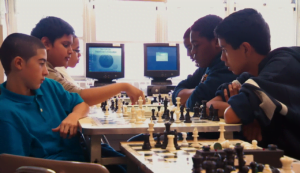
In this sense, Brooklyn Castle is not a film about chess. It’s about something much larger and more important than that: education. Education, as the film constantly reminds us, has countless permutations, each one judged on the basis of its effectivity in relation to every individual child. In Brooklyn Castle, that permutation is chess, deploying the game as an educational tool in an extraordinary way. Whilst these underprivileged children are able to compete in national chess tournaments across the country (hosted annually by the United States Chess Federation) and win in big and exciting ways, what’s truly special is how the game is used as a springboard to accomplish what may otherwise have been out of reach. Chess has been woven into the lives of these students (and their teachers’), and through it they experience friendship and family, failure and success, and, when it’s all said and done, hope.
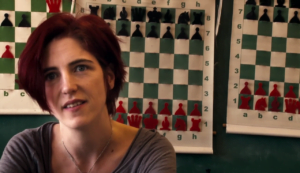
Directed by Katie Dellamaggiore, who funded a lot of it herself, the film is an absolute success. When these kids sit down to play chess, the first moves are made with electricity, and pieces vanish from the board with incredible assurance. “The geeks,” as Rubino says, “they are the athletes.” As it should be, given the school is home to some of the best young chess players in the United States. The school’s chess story started in the 90’s when it was decided that its small group of chess devotees should compete in the nationals. In a surprise turn of events, they won. The school is now widely recognised as having the best chess program for a middle-school in the entire country, masterminded by assistant principal John Galvin and chess wizard Elizabeth Vicary.
Life in Williamsburg, Brooklyn
Their success has not been without its bumps, though, and the point of drama around which the film pivots are the budget cuts that were enforced as a result of the financial crisis towards the end of the last decade. I.S.318 saw 1.3 million dollars taken out of its budget, with the immediate knock-on effect of limiting after-school activities which, as the film indicates, includes more than just chess, but many more essential after-school programs that keep kids going. And the reality is that these cuts keep on coming, too; Brooklyn Castle’s story isn’t bookended with a neat beginning and end. It’s a story that’s still going today.
When the film takes us into the private lives of its young protagonists, we realise how stark that reality can be. They’re all from low income families desperately trying to stay ahead, working day in, day out to keep the lights on and hopefully keep a little extra for their child’s college fund. They don’t have the money to attend state-wide chess tournaments, so the opportunities to travel and experience new places the school offers is a gift none of them take lightly. What makes the film so endearing is that none of this stops the kids from having big, big dreams. Their accomplishment in chess is only the beginning; it gives them the aspiration to achieve more, and it’s this idea that the film always doubles down on. Vicary, their chess teacher, emphasises the nebulous nature of chess as a subject. There’s no clear right or wrong in the game. And so when she says, “[It’s] very hard to know what that best move is”, you can’t help but extrapolate that statement to life itself, and ultimately to what these kids really need.
Where are they now?
Although the film follows five students, we thought we’d check in on three of them and see where they’re at now, four-five years after filming.
Rochelle Ballantyne
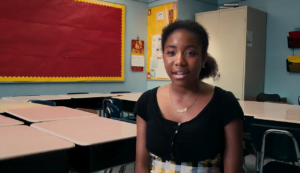
The timid, eager, and unassuming Rochelle Ballantyne was only 13-years-old at the time of filming, but distinguished herself as the best chess player in the school. Now, she holds a scholarship to Stanford University, and is on track to becoming the country’s first African-American chess “master”. It’s a goal that is nurtured throughout the film, as she weighs up the demands of fulfilling her dream and the ordinary, but no less important, demands of high school. Rochelle manages to find the line and walk it.
Alexis Paredes
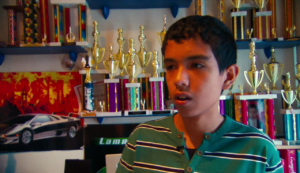
The smart and talented Alexis Paredes dreams of becoming a lawyer or a doctor, of making it big so he can live a good life and provide some financial relief to his South American parents. The trials and tribulations of parenthood are a running theme throughout the film, and it always draws attention to the quiet heroism of mom and dad. Unlike in Searching for Bobby Fischer (1993), chess doesn’t alienate parent and child – it brings them together. Paredes is now a chess instructor and studying political science and government at the University of Albany.
Oghenakpobo ‘Pobo’ Efekoro
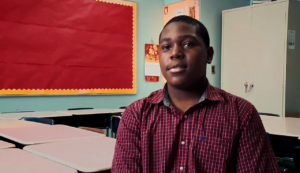
And there’s Oghenakpobo ‘Pobo’ Efekoro, keeping the team together with open, honest intelligence and an easy going charm and grace. Born to Nigerian parents, Pobo had never left New York state until he was afforded the opportunity to do so by I.S.318’s chess program. Pobo’s charm is infectious, to both the audience and students alike, and his success has far exceeded his evident skill at chess. After becoming student president during the course of the film (with the campaign slogan “Pobobama”), Pobo has gone on to study Foreign Affairs and Sociology at the University of Virginia, and is a star player on their track and field team.
Their aspirations know no limit, and their enormous success at chess gives them the hope they need to aspire to them. Their accomplishment feeds their aspiration, teaching them that it is entirely possible to fulfil their dreams. It’s not difficult to stress how important the chess program has clearly been for the students at I.S.318, both those in the film and those we don’t get to meet, but who are surely reaping the benefits of such a meticulously planned, and carefully supervised, activity such this chess program. It teaches patience, goal-oriented thinking, how to plan, logic – all of which are essential attributes that can be taught in a variety of ways. It just so happens it was chess.
